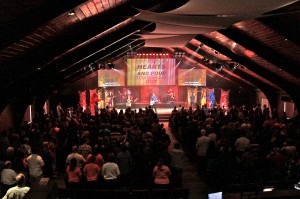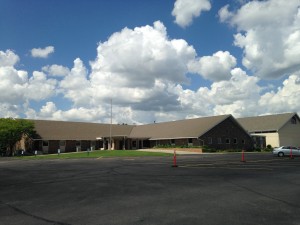Big Lake-based Riverside Alliance Church isn’t trying to make waves by adding an abandoned St. Michael movie theater to its fold. Rather, it’s a community-based church trying to find another spot to house a congregation that is, each Sunday, bursting at the seams.
“In fact, it’s not even Sundays,” corrects Associate Pastor Skipp Machmer, who has been with the church for 14 years. “There’s something going on here all the time. It’s become a community hub for people.”

The main worship area of the Riverside Church in Big Lake Township, just north of Monticello. Music, screens and bright lights are part of each week’s service. (Photo provided by Riverside Alliance Church)
Attending church services at Riverside is quite like attending a community event. There are greeters, a coffee cafe, social areas for prior to and after service – and each area is bustling. Pastor Tom Lundeen guides a Sunday audience through a day of scripture, prayer, speeches and booming music. It’s a modern day service based in the tradition of Christianity.
And modern might be the key word. The sound system is state-of-the-art. Production to screen the service to multiple locations within Riverside’s current campus, including classrooms, a cafe with tables and, of course, streaming online involves sound boards, high definition cameras and lighting that would make some Minneapolis stages jealous.
Partly because of the production put into each of Sunday’s three services, and partly because of that community “hub” ideal Machmer mentioned, Riverside has seen its participation triple in the last 10 years, Lundeen said.
“The feedback we get is people here have a fantastic experience. And our goal, really, is to have an impact on people. We want to give people something that applies both in their spiritual life and a message they can apply in everyday life. And to realize that life has a way of reminding us that we’re not in total control. The place has a definite buzz and excitement, each week. And our message is based in the teachings of Jesus Christ,” Lundeen said. “All of that has made a connection and impact on people here.”
Looking for a Second Home
Since 2007, part of the church’s mission has been to find a new way to accommodate all of these new faces. Last year alone, Machmer said, Riverside “touched” more than 1,900 people in northern Wright County alone. Riverside’s membership is more than 480 people, as well as another 1,000 who regularly attend.
“We had to look at those figures a couple of times,” Machmer said. “We were really surprised at that number.”
“And,” added Lundeen, “that doesn’t include those who didn’t leave any sort of contact information. Maybe they didn’t fill out a visitor’s card, but they still come back. Maybe they don’t have children who use the ministry.”
So a search began for a second site, or Multisite mission, as the church has dubbed it. The process was on the back burner, or lower on the agenda, for a while, Machmer and Lundeen said. Expansion and renovation within the current campus, just across the Mississippi River bridge on Highway 25, helped a lot. Adding a third service on Sundays, which they did in 2011, also staved off the need. But in 2013, a push was made to find a second home.
“At first we pushed for Monticello, south of the interstate,” Lundeen said. “We knew, from our data, that we were drawing in people from Albertville, St. Michael, Monticello and Otsego. But a physical barrier – well, there’s two – is the freeway and the river. It makes it harder to get here, particularly during a weeknight. So we thought a campus on the south side of Monticello would work.”
As that process moved forward, the result of work by the church’s board of elders and leadership since 2007 looked to be near complete. A purchase agreement was discussed after a building was found.
And then, the two men said, Wayne Elam called about the St. Michael theater.
It was actually the third time a St. Michael location had been brought to their attention. Before the theater closed in 2010, Riverside was approached by the Alliance District Superintendent to consider using the current Alliance church, now Connect Church, to establish a presence in St. Michael. But the timing was off, and efforts to start a new church in St. Michael have since flourished, something Machmer and Lundeen both said they are excited about.
After the theater closed Riverside was contacted by the liquidator and asked to consider purchasing the theater. A second tour was done, soon before chairs, lights and everything else imaginable was taken from the building in 2011-2012. Again, Lundeen said, the timing wasn’t right. “It was a large building, large undertaking with a large amount of debt,” he added.
So once again, based on the call from Mr. Elam in early 2014, the board of elders discussed the theater, and they prayed. They decided they would “leave it up to God to open or close a door” on the options in front of them.
And the deal with the Monticello site fell through the next day.
“Suddenly, the theater became the only, real, available option to us for a second site. And we know that now is the time to do this,” Lundeen said.

The exterior of the current Riverside Church on Highway 25. “It’s deceptively big,” said Associate Pastor Skipp Machmer. A basement running underneath the entire building houses child programming for infants, grade-schoolers and teens alike.
Discussions started with the City of St. Michael. But a zoning ordinance that requires churches within the city to be built in residential areas, not commercial, seemed to thwart any hopes of a purchase.
“We were in a situation where the ordinance, which we believe is illegal according to federal law, stopped us from having a purchase agreement. And without that agreement we can’t come to city to start the process,” Lundeen said. “So we were stuck. Putting Riverside, which draws thousands of people every Sunday, in a residential area would be a negative thing. It just wouldn’t work.”
Suddenly, however, the Cinemagic option, too, seemed to be gone. A theater owner from Woodbury, owner of Cinemasota, bought the theater.
Staying in the Mix
But all wasn’t lost. Riverside stayed in the mix because, as we now know (signs are still on the building); the current owner also wants to sell. A deal within the current ownership group had fell through, and Riverside remained an interested party.
But what about that law? And that ordinance?
While the city maintains its right to guide development, the church is pointing to the the Religious Land Use and Institutionalized Persons Act, or RLUIPA, an act passed in 2000 confirmed in district court, in 2010, which states cities can’t place “undue burden” on religious organizations looking to rent or purchase gathering space, among other factors.
Discussions stalled, the two men said, as Riverside again approached the city with the intent to buy the building from its newest owner.
So the church asked its attorneys to send a letter to city staff in late May.
“We felt we had no other options,” Machmer said.
That led to a brief response from St. Michael Attorney Dave Lenhardt, discussing any possible litigation, at a city meeting earlier this month, and the issue going public.
Riverside realized the response would come from both sides, but has a clear message for everyone involved.
A Community Church
Since its inception in the 1930s, Riverside has tried to be a “community church” first, Machmer said. Sparking up a fight with the City of St. Michael isn’t something they’re looking to do. In fact, both men said, talks have rekindled with the city.
“The theater is an option that has always sort of come to us,” Lundeen added. “This isn’t a building we’ve been licking our chops over ever since it closed. But when it comes to St. Michael, we’re already there. We have households and families who have a big part in our church. And I think a location there would allow us to continue to have a positive impact on families and people in the community.”
“Really, Riverside is something we think could be a real benefit to people and families in St. Michael,” Machmer said. “If it happens, we think it’s something very positive that can grow in the St. Michael community.”